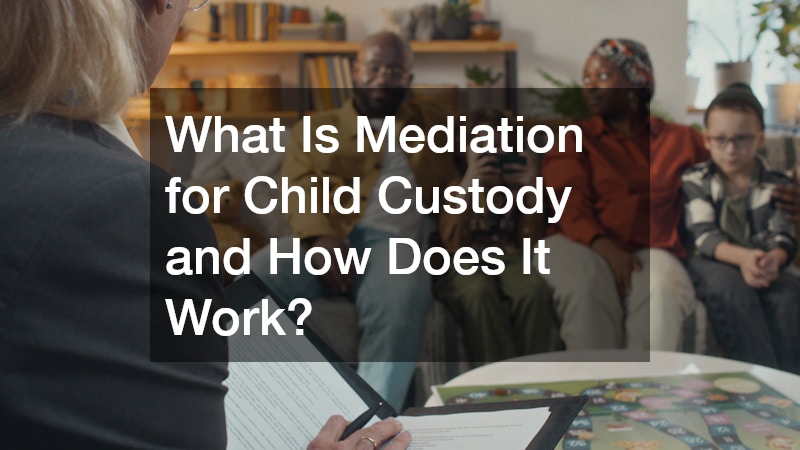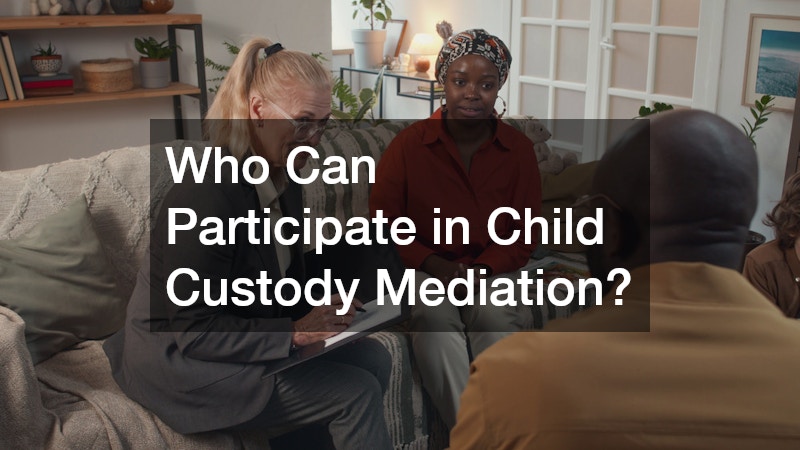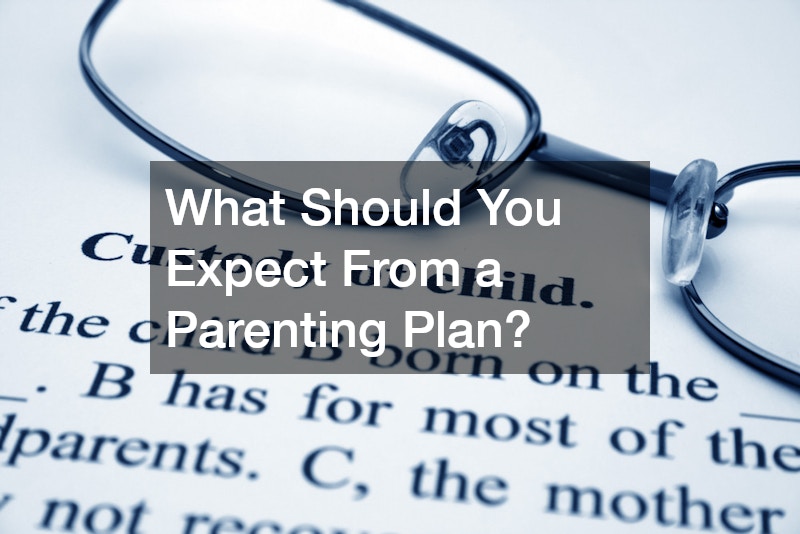Disclaimer: This website shares legal information for educational purposes only and does not constitute legal advice. Please consult a licensed attorney for advice specific to your situation.
Divorce is rarely easy, especially when children are involved. For many parents, figuring out how to co-parent after separation is one of the most emotionally charged and complex aspects of the process. Fortunately, there’s a less adversarial way to resolve these issues: mediation for child custody. Instead of letting a judge decide what’s best for your child, mediation allows parents to collaborate and make informed, mutually agreeable decisions about custody arrangements.
This article breaks down what child custody mediation is, how it works, and why it might be the best option for your family. Whether you’re just beginning the divorce process or already entangled in a legal dispute, understanding mediation can help you reduce stress and prioritize your child’s well-being.
What Is Mediation for Child Custody?
Mediation for child custody is a voluntary or court-mandated process where divorcing or separating parents work with a neutral third party to resolve disputes related to custody and parenting arrangements. The mediator does not take sides or make decisions but facilitates productive communication and helps both parties reach a mutually acceptable agreement.
Unlike courtroom battles that can be hostile and draining, mediation is focused on cooperation. It’s often less expensive, less time-consuming, and far more child-focused than litigation. The ultimate goal is to ensure that the best interests of the child are met while giving both parents a say in how custody will be handled moving forward. Mediation allows parents to come up with creative solutions that may not be possible in a courtroom setting. The process aims for a fair and balanced solution, keeping your child’s emotional and physical needs at the forefront.
Mediation can cover a wide range of parenting topics, including:
- Physical custody (where the child will live)
- Legal custody (decision-making responsibilities)
- Visitation schedules
- Holidays and special events
- Communication between parents
- Travel and relocation terms
Why Choose Mediation Over Litigation?
Choosing mediation over litigation isn’t just about saving time and money—it’s about preserving relationships and reducing conflict for the sake of your children. While every family situation is unique, there are some compelling reasons many parents choose mediation as their first step.
Benefits of Child Custody Mediation
- Less stress for everyone involved: The informal setting and cooperative tone of mediation often lead to reduced anxiety for both parents and children. It’s a more emotionally supportive process that can help parents navigate the intense emotions associated with child custody disputes.
- You stay in control: You and your co-parent make the decisions, rather than a judge who doesn’t know your family. This gives you the opportunity to create a more customized and workable arrangement for both parties.
- Better for long-term co-parenting: Agreements reached voluntarily are more likely to be respected and followed, which lays the groundwork for a more peaceful co-parenting relationship. This can lead to fewer conflicts down the road and promote consistency for your child.
- More flexible solutions: Mediation allows for creative solutions that the court might not be able to offer. For instance, parents can work out detailed schedules for special holidays or personalized rules regarding travel, which might not be possible with a rigid court order.
- Cost-effective: Mediation is generally far less expensive than going to court. Since it involves fewer legal fees, it’s a more budget-friendly option for parents who want to avoid costly legal battles.
Mediation is particularly helpful for parents who want to keep their children out of legal conflict and protect them from the emotional fallout of a bitter custody battle. The collaborative nature can also make it easier for parents to maintain communication, which is key for long-term co-parenting success.
Who Can Participate in Child Custody Mediation?
Mediation is suitable for most parents going through divorce or separation, regardless of whether they were married or not. Courts in many jurisdictions may even require parents to attempt mediation before moving forward with a custody trial.
However, mediation may not be appropriate in cases involving:
- Domestic violence or abuse
- Severe power imbalances between parents
- Ongoing substance abuse issues
- One party refusing to cooperate or negotiate in good faith
In these situations, the court may bypass mediation or assign a specialized mediator trained to handle high-conflict or abusive dynamics. Additionally, if one parent is unwilling to engage in the process, the mediator may find it difficult to foster productive dialogue. In such cases, litigation might be necessary to ensure that the child’s best interests are protected.
The court may also consider using child custody evaluators or other specialists to assess the family dynamic and offer recommendations if mediation is deemed ineffective or unsafe.
How Does the Mediation Process Work?
Every mediation process follows a general structure, but it can be tailored to fit the needs of the family and court requirements in your area. Here’s what you can typically expect.
1. Initiating the Process
Mediation can be started in several ways:
- Voluntary: You and your co-parent agree to seek out mediation on your own. This is often the most cooperative and flexible way to begin the process, as both parties have already agreed to work together.
- Court-ordered: A judge may require mediation before hearing a custody case. If you are already involved in a legal custody battle, the court may order mediation as a step before moving forward with a trial.
Once mediation is agreed upon, both parties usually select a qualified mediator who has experience in family law and child custody cases. Many courts have lists of approved mediators, or you can seek recommendations from an attorney or family law association. Choosing a mediator that both parents trust is important for ensuring a smooth and productive process.
2. Pre-Mediation Preparation
You may be asked to fill out paperwork, provide background information, or attend a short orientation. It’s wise to come prepared with:
- A proposed parenting plan
- Your child’s needs and schedule
- Any concerns you have about the other parent’s involvement
Both parents should prepare by understanding their goals and what they want to achieve from the mediation. Being flexible and open to compromise is often key to reaching a successful agreement. Preparation ensures that the mediator can focus on helping resolve any issues without wasting time on misunderstandings.
3. The Mediation Sessions
These are typically held in a neutral setting and can last from a few hours to multiple sessions, depending on the complexity of the case.
During the sessions:
- The mediator will guide the discussion, ensure fairness, and help clarify points of disagreement. They will often start by establishing ground rules to ensure respectful communication throughout the process.
- Each party has the opportunity to speak and present their perspective. The mediator listens carefully to each side, summarizing the concerns and guiding both parents toward potential solutions.
- The focus remains on collaboration, not confrontation. If necessary, the mediator may meet with parents individually to address issues privately, helping to foster a better atmosphere for negotiation.
If emotions run high, the mediator may choose to meet with each parent separately (called caucusing) before bringing everyone back together. This allows the mediator to clarify any points of contention and suggest potential compromises.
4. Reaching an Agreement
If an agreement is reached:
- The mediator drafts a parenting plan that outlines custody arrangements and responsibilities. This plan can address both immediate and long-term needs, helping to prevent future disagreements.
- Both parents review the plan with their respective attorneys (if applicable). Legal counsel can help ensure that the terms are fair and legally sound before submitting them to the court.
- The final agreement is submitted to the court for approval and becomes legally binding.
If mediation fails to produce an agreement, the case can still proceed to court, but mediation can often resolve at least some of the issues and simplify the litigation process.
What Should You Expect From a Parenting Plan?
One of the key outcomes of custody mediation is a detailed parenting plan. This plan lays the foundation for how you and your co-parent will raise your child after the separation.
Key Elements of a Parenting Plan
- Residential schedule: Includes daily routines and where the child will live. The schedule should take into account the child’s age, school schedule, and other factors that contribute to their stability and happiness.
- Holidays and vacation time: Determines how special days are shared. It’s essential to address major holidays, school breaks, and birthdays, as these can be sensitive times for families.
- Decision-making responsibilities: Who will make decisions about education, healthcare, religion, and extracurricular activities? Clarifying these responsibilities in advance can prevent conflicts later on.
- Communication guidelines: How and when the child will speak to each parent during visits or absences. This might include setting rules about phone calls or virtual communication to maintain the child’s bond with both parents.
- Transportation logistics: Who is responsible for drop-offs and pickups? Having clear expectations around transportation helps prevent confusion or conflicts.
- Dispute resolution: Outlines how future disagreements will be handled (e.g., additional mediation). This ensures that parents have a plan in place to deal with potential issues without escalating to court.
Creating a parenting plan through mediation ensures that it reflects the values and preferences of both parents and keeps the child’s needs at the center. It’s a tool for cooperation, offering a clear framework for ongoing co-parenting.
What If Mediation Doesn’t Work?
Mediation isn’t a magic bullet. If one or both parties refuse to cooperate or if the issues are too complex, mediation may break down. In such cases:
- You may proceed to a custody hearing or trial. At this stage, a judge will review the case and make a decision based on the best interest of the child.
- The court will decide custody based on your state’s “best interest of the child” standard. Courts usually consider factors like the child’s relationship with each parent, the parents’ ability to cooperate, and the child’s needs.
- Judges may also appoint a guardian ad litem or custody evaluator to assess the family situation. These professionals can provide expert insight into the child’s needs and recommend the best course of action.
However, even partial success in mediation can reduce the number of contested issues and make court proceedings more manageable. If mediation resolves some but not all issues, it can still make litigation more efficient and focused on the most pressing concerns.
How to Choose the Right Mediator
The mediator you choose plays a crucial role in the outcome of your case. Here’s what to look for:
Questions to Ask When Selecting a Mediator
- Are you certified or licensed in family law mediation?
- How much experience do you have with child custody cases? Look for mediators who have a proven track record of resolving similar disputes.
- How do you handle high-conflict situations? If your relationship with your co-parent is tense, it’s important to find a mediator skilled in managing these dynamics.
- What is your approach—facilitative, evaluative, or transformative? Some mediators focus on helping parents work collaboratively, while others may offer more direct advice on how to resolve disputes.
- Do you offer virtual mediation options? Virtual mediation may be more convenient for parents who are unable to attend in-person sessions.
Ask for referrals from your attorney, therapist, or court services office, and check online reviews or credentials through professional mediation associations. A good mediator can make a significant difference in how smoothly the process goes.
Is Child Custody Mediation Legally Binding?
While the mediation process itself is not legally binding, the agreement you reach can be made binding once it is approved by the court. Once signed by a judge, the custody agreement becomes a court order that both parents must follow.
Failure to comply with the terms of this agreement can lead to legal consequences, including court enforcement, modification, or contempt proceedings. This makes it crucial for both parents to fully understand the terms of the agreement before submitting it to the court.
Final Thoughts: Is Mediation the Right Choice for You?
Mediation for child custody is not just a legal process—it’s a compassionate, child-centered alternative to courtroom conflict. It empowers parents to take control of their family’s future, fosters cooperation, and sets a strong foundation for successful co-parenting.
If you’re going through a divorce or separation and want to protect your child from unnecessary emotional strain, mediation may be the first and best step toward a healthier resolution.


